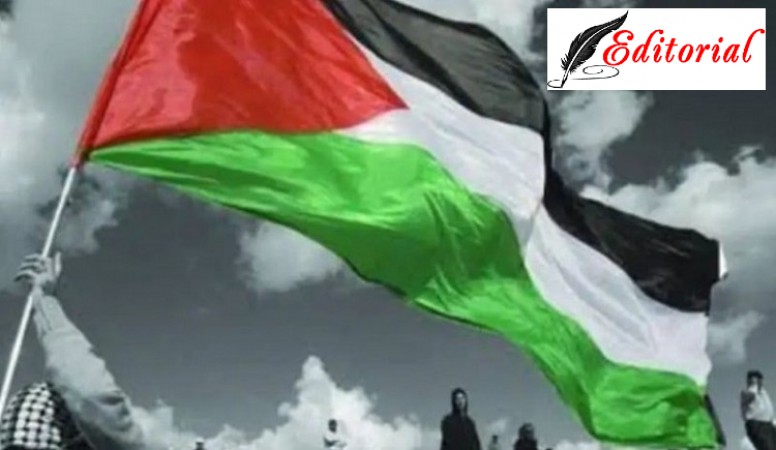
EDITORIAL: In the grim tableau of conflict, blood is shed indiscriminately, as recent reports bear witness. The annals of this strife reveal a harrowing tale: a barrage of 1000 rockets unleashed by Hamas, aimed at the northern precincts of Tel Aviv in Israel, claimed the lives of a hundred souls. In retaliation, the Israeli counterattack exacted a devastating toll, resulting in the loss of over 700 lives in Gaza. However, the darkness of this narrative deepened with reports of Hamas insurgents breaching the border, crossing into Israeli territory, and perpetrating acts of violence while taking Israelis hostage. These reports, undeniably, cast a pall of distress and dread.
The roots of this escalating tragedy can be traced back over the preceding months, where Palestinians found themselves ensnared in the throes of Israeli oppression centered around the sacred Al-Aqsa compound in the occupied West Bank and East Jerusalem. Israeli military forces and police, it seemed, pursued a relentless campaign, apprehending youths and teenagers with unwavering determination. Amidst this turbulent backdrop, the world watched as the Palestinian struggle and the Jewish occupation of Palestinian lands played out, almost as if serving as a diversion from the democratic protests sweeping across Israel.
In a daring gambit, Hamas, with its stronghold in Gaza, unleashed a fusillade of rockets, heralding what they called "Operation Al-Aqsa Flood." This unexpected onslaught took Israel by surprise, delivering a resounding blow to a nation equipped with a formidable defense system. The international community, along with numerous nations and organizations, swiftly condemned this act of aggression. Israel's Chief of Staff, Lt. Gen. Herzi Halevi, declared an ominous warning, affirming the commencement of war, while Prime Minister Benjamin Netanyahu vowed that Gaza would be left behind. Yet, violence and bloodshed can never be the path to resolution; to truly live, one must allow others to live as well.
No nation, not even India, can absolve itself of the moral responsibility entailed in this mass atrocity. The question looms large: have the nations of the world and the United Nations been effective in intervening to address the Palestinian issue? Have the international agreements and UN resolutions concerning Palestine found adherence? Have major powers, including the United States, ever been willing to confront Israel's relentless occupation? From the inception of the Balfour Declaration, which laid the foundation for Israel's statehood, a multitude of resolutions and agreements have emerged. The Fourth Geneva Convention specifically prohibits the deportation of individuals to occupied lands and recognizes the rights of traditional inhabitants of disputed or war-captured territories.
UN Security Council resolutions in 1949 and 1967 categorically denounced occupation and the accompanying human rights violations. The Oslo Accords, the Camp David Accords, and various bilateral agreements brokered by Jordan have all espoused the principle of bilateral coexistence, even if they occasionally clashed with Palestinian interests. Regrettably, none of these efforts has stemmed the tide of Israeli occupation, especially when figures like Itmar Ben Givir, who led the incursion into the Al-Aqsa compound, gain prominence within Israel's leadership.
Israel has consistently sidestepped adherence to the borders delineated by the UN. Not only did it fail to retract from territories captured in the 1967 war, but it also continued to expand its occupation into new territories. To this day, Israel has yet to establish clear and defined borders. Agreements to halt the encroachment have remained elusive. The United States, during President Donald Trump's tenure, recognized Jerusalem as Israel's capital, a move that contradicts the capital proposed for a future Palestinian state. President Joe Biden has maintained this stance. The narrative propagated by the U.S. and its allies suggests that Israel, the world's foremost military power, perpetually exists under threat, a narrative that gains further credence with each volley of rockets launched by Hamas.
In this tumultuous landscape, our Prime Minister's response seems to overlook these critical nuances. Palestinian children resort to pelting stones, driven by desperation in the face of a strategy that appears to consign them to oblivion—a strategy championed by figures such as David Bangurian, Ariel Sharon, and Benjamin Netanyahu. These people, entrenched in the Palestinian struggle, are fighting for their very existence, transcending history itself, as the Zionist vision threatens to reduce and reshape the map of Palestine beyond recognition.
While we may unequivocally reject Hamas, we must also grapple with the profound question: what is the fate of those men seemingly destined to vanish from the map? Are not the Palestinian teenagers who meet a tragic end, often just for approaching a symbolic column, deserving of our recognition as fellow humans? Do not the two million inhabitants of Gaza possess the fundamental right to life and peace? These are questions that demand answers, as the world witnesses the ongoing tragedy unfolding in the heart of the Middle East.